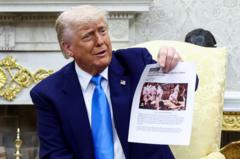In an extraordinary meeting at the White House, President Cyril Ramaphosa of South Africa faced off against President Donald Trump, who launched a well-choreographed attack focusing on the contentious claims of "white genocide" in South Africa. The meeting, part of Trump's active second term, was marked by a mix of political theatrics and strategic maneuvering as South Africa’s president sought to maintain his composure against Trump's assertive claims.
The encounter began with a discussion on the state of affairs in South Africa but took an unexpected turn when Trump was prompted to elaborate on his controversial views about the supposed persecution of white South Africans. With the cameras rolling, he summoned an assistant to "turn the lights down" and proceeded to showcase a video featuring inflammatory political rhetoric that stirred discontent around the land reform issue in South Africa.
Trump's display included images of political figures chanting provocative slogans, and despite having no direct authority to confiscate land from white farmers, he framed the narrative in a way that suited his rhetoric. Ramaphosa, equipped with a prepared response, emphasized the need for Trump to “listen to the voices of South Africans,” steering the conversation back towards his commitment to unity and reconciliation.
In an unusual diplomatic strategy, Ramaphosa brought along two prominent South African golfers, Ernie Els and Retief Goosen, which appeared intended to placate Trump. Their presence seemingly diverted some of the president's attention away from Ramaphosa. The golfers' discussions on the plight of white farmers received considerable airtime, allowing Ramaphosa to step back from the direct heat of Trump's accusations.
Despite Trump’s provocative inquiries and offers to assist white farmers facing alleged persecution, Ramaphosa remained unruffled, countering with statements that sought to undermine the incendiary narratives presented. At one point, he noted the improbability of there being genocide given the presence of affluent, influential members of the Afrikaner community in his delegation.
As tensions simmered, it became clear that while Trump's performative diplomatic approach aimed to resonate with his domestic supporter base, Ramaphosa had secured a degree of success by keeping the discussion focused and composed. The meeting exemplified the intricate dance of power and perception in international relations and left observers wondering how these dynamics would influence future engagements.
Ultimately, this spectacle beautifully illustrated the ongoing struggle between political narratives and the realities on the ground, with Ramaphosa emerging as a resilient leader in the face of formidable challenges.

















